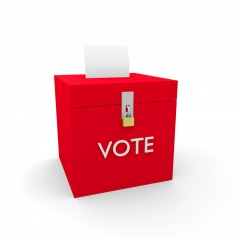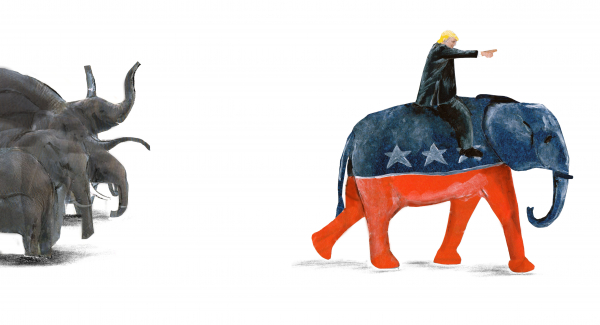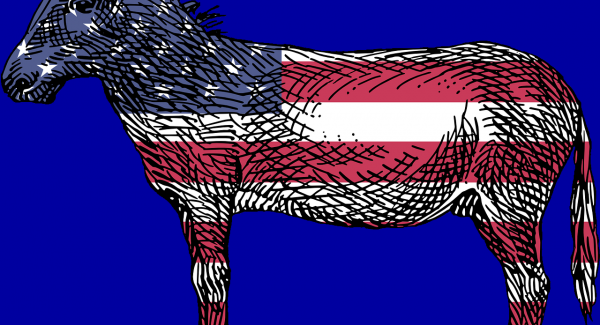Republican presidential nominee Donald Trump has departed from the usual norms of campaigning by repeatedly alleging that the November election is “going to be rigged” by his opponents. In recent research, we find that concerns about the fairness of elections in the current era may have an insidious racial component. Specifically, we present evidence indicating that White Americans with more negative attitudes toward African Americans were more likely to see the 2008 and 2012 elections as unfair, even after controlling for other key reasons why citizens might dislike a particular election result (i.e., party identification and ideology).
As with many other things during this year’s US presidential election campaigns, Republican presidential nominee Donald Trump has departed from the usual norms of campaigning by repeatedly alleging that the November election is “going to be rigged” by his opponents. Trump’s claims seem to be trickling down to his supporters as well: a survey found that 7 out of 10 North Carolina voters backing Trump believe that if Hillary Clinton wins in November, it will be because the vote was rigged. Naturally, observers have raised concerns about the extremity of (and lack of hard evidence for) sentiments like these and their potential to chip away at the legitimacy of democratic institutions. Given the stakes, we believe that is important for social scientists look closely at what might be driving these troubling doubts about the fairness of the electoral process. Though some of this willingness to deny the legitimacy of electoral processes undoubtedly stems from seeing one’s candidate lose in an era of deep polarization (Sances & Stewart, 2015), we argue that American racial animosities that have come to influence attitudes toward everything from health-care reform to fiscal policy in the Obama era now also play a role in shaping White Americans’ beliefs about the fairness of US elections.
In this respect, concerns about American electoral unfairness in the present era did not begin with Trump. For example, worries about alleged widespread voter fraud have become endemic over the course of Barack Obama’s presidency, and they have inspired a wave of legislation at the state level aimed at tightening voter-ID requirements (Sobel, 2009). Such laws typically require individuals to show some form of government-approved identification when they show up at the polls.
These efforts have become quite controversial, given both a wealth of evidence suggesting that fraud of the sort targeted by voter-ID laws is extraordinarily rare (Minnite, 2010) and the laws’ potential to depress turnout among racial-minority groups (Barreto, Nuno, & Sanchez, 2009).
Critics of voter-ID legislation have especially zeroed in on the latter concern, arguing that the laws are a racially-motivated form of vote suppression. Though partisan motivations undoubtedly played a role in the rush to pass voter-ID laws—they have typically been sponsored by Republican legislators, and their burdens fall disproportionately on groups that tend to vote Democratic—both recent court decisions and social-science research (Bentele & O’Brien, 2014) have found evidence that concerns about checking the power of Black voters figure into the push to tighten voter requirements. Indeed, some Republican officials have gone so far as to admit that they were targeting African-American voters, rather than seeking to fight voter fraud more generally. More importantly from our perspective as political psychologists, studies also suggest that support for efforts to protect the “integrity” of the vote may be rooted in racial animus in the general public. For example, political scientists David Wilson and Paul Brewer (2013) found that feelings of resentment toward African Americans are one of the strongest predictors of support for stricter voter-ID laws, even after controlling for factors like partisanship and ideology.
So, there is some evidence that opinions about policies aimed at preventing alleged voter fraud have a partial basis in racial animus. But what about perceptions of the fairness of elections in general? Like attitudes toward voter ID, we argue that these perceptions have become racialized. The reason for this is that the outcomes of the last two presidential elections are intimately tied to the most visible symbol of the demographic and cultural changes currently upsetting the traditional racial order in America: President Obama. Our claim is that the election (and re-election) of the nation’s first African American president has increased the salience of race in the context of elections, leading White Americans to make judgments about the fairness of recent electoral contests partly on the basis of their racial attitudes.
Indeed, racialized judgments of this sort have become a hallmark of the current political era. Not surprisingly, Whites who harbor negative feelings about African Americans also tend to especially dislike Obama, even compared to other similarly-liberal Democratic political figures. In turn, this racialized dislike of Obama has “spilled over” to policy positions that have become linked to the president in the public mind. Consistent with this story, political psychologist Michael Tesler (2016; see also Knowles, Lowery, & Schaumberg, 2010) found that hostility toward African Americans became a strong predictor of attitudes toward economic-stimulus spending and health-care reform after Obama’s ascent to the presidency, despite having little or no relationship with opinions about either of these topics prior to the 2008 election. Although this pattern extends to judgments as benign as opinions about the Obama family’s dog, Bo, our evidence suggests that it extends to attitudes as important as the integrity of national elections.
To test our hypothesis that perceptions of electoral fairness have become similarly racialized, we used data from over 9,000 White respondents who participated in the 2008 Cooperative Campaign Analysis Project. To get a measure of how fair respondents thought the election was, we looked at answers to a question asked in the weeks after Election Day:
“In some countries, people believe their elections are conducted fairly. In other countries, people believe that their elections are conducted unfairly. Thinking of the presidential election we’ve just had, do you believe it was very fair, somewhat fair, neither fair nor unfair, somewhat unfair, or very unfair?”

To assess racial attitudes, we used responses to four survey items measuring racial resentment (Kinder & Sanders, 1996). These items ask whether a legacy of racism and discrimination has made it difficult for Blacks to get ahead, whether Blacks have gotten less than they deserve in the United States, whether Blacks would be as well off as Whites if they tried harder and whether Blacks should be able to overcome prejudice the same way other minority groups did, without any special favors. The higher the score the respondent received on this measure of racial resentment, the less sympathetic toward Blacks he or she was.
We then looked at the relationship between racial resentment and perceptions of electoral fairness, while controlling for several background variables like age, gender, income, and education (so that we could really focus on the role of racial resentment in particular). Since all of us may be inclined to doubt the legitimacy of an election in which a candidate with views opposed to our own won, we also included controls for identification with the Republican Party and ideological conservatism. We found that Whites high in racial resentment were less likely to believe that the 2008 election was conducted fairly, even after accounting for their party loyalties and ideological views. To be sure, the effect of racial resentment was weaker than that of party membership, but it was comparable in magnitude to the effect of ideology.
These results are consistent with our argument, but they do suffer from one shortcoming: the racial resentment measure is the subject of much controversy among political psychologists, with some arguing that it is hopelessly confounded with individualistic values that have nothing to do with race, such a strong belief in self-reliance and minimal government (e.g., Sniderman & Tetlock, 1986). To address this problem, we repeated our analysis with a measure of the degree to which respondents stereotyped African Americans as less intelligent and hard-working than Whites. If anything, our results were even stronger when we used this alternate racial-attitude measure: respondents who negatively stereotyped African Americans were less likely to see the 2008 election was fair, and the effect of stereotyping was greater in magnitude than the effects of both Republican partisanship and ideological conservatism.
In order to ensure that this pattern of results was not unique to the first election where Obama was a candidate, we conducted the same analysis using data from White respondents to the 2012 American National Election Study. Our results suggested that Obama’s first term as president did nothing to ameliorate the racialization of electoral-fairness judgments. In fact, we found that both racial resentment and stereotyping were stronger predictors than party identification and ideology of seeing the 2012 election as unfair. For example, the impact of racial resentment on perceptions of unfairness was twice as large as the impact of Republican partisanship, whereas the impact of stereotyping was more than four times larger than that of partisanship.
Importantly, these results appear to be unique to the 2008 and 2012 elections. For comparison, we looked at data from two other recent elections where Barack Obama was not on the ballot, using the 1996 and 2000 American National Election Studies. These were the most recent pre-2008 surveys we could find that included both racial-attitude and electoral fairness measures. In both of these years, we found virtually no relationship between racial attitudes and fairness judgments. For example, the relationship between negative stereotyping of African Americans and perceptions of electoral unfairness in both years was much smaller than it was in 2008. Thus, the racialization of electoral fairness judgments is a recent development, and one that appears to be tied to Obama’s historic victories in 2008 and 2012.
So, where does this leave us? In the heady days following the 2008 election, a common theme was that President Obama’s historic victory may have signaled the arrival of a “post-racial” America. However, social science research suggests that, if anything, President Obama’s election has demonstrably increased the near-term relevance of racial concerns (Tesler, 2016). Our results indicate that the spillover of racialization may not be limited to normally contested policy arguments and vote decisions, but may also threaten certain citizens’ confidence in the integrity of bedrock political institutions like elections. Racial animus is perhaps more consequential than ever, and its influence may extend even to perceptions of the political system as a whole.
References
Barreto, M., Nuño, S., & Sanchez, G. (2009). The disproportionate impact of voter-ID requirements on the electorate—new evidence from Indiana. PS: Political Science and Politics, 42, 111–16.
Bentele, K. G. & O’Brien, E. (2013). Jim Crow 2.0?: Why states consider and adopt restrictive voter access policies. Perspectives on Politics, 11, 1088-1116.
Kinder, D. R., & Sanders, L. M. (1996). Divided by color: Racial politics and democratic ideals. Chicago: University of Chicago Press.
Knowles, E. D., Lowery, B. S., & Schaumberg, R. L. (2010). Racial prejudice predicts opposition to Obama and his health care reform plan. Journal of Experimental Social Psychology, 46, 420-423.
Minnite, L. C. (2010). The myth of voter fraud. Ithaca, NY: Cornell University Press.
Sances, M. W., & Stewart, C. (2015). Partisanship and confidence in the vote count: Evidence from U.S. national elections since 2000. Electoral Studies, 40, 176-188.
Sniderman, P., & Tetlock, P. (1986). Symbolic racism: Problems of motive attribution in political analysis. Journal of Social Issues, 42, 129-150.
Sobel, R. (2009). Voter-ID issues in politics and political science. PS: Political Science and Politics, 42, 81-85.
Tesler, M. (2012). The spillover of racialization into health care: How President Obama polarized public opinion by racial attitudes and race. American Journal of Political Science, 56, 690-704.
Tesler, M. (2016). Post-racial or most-racial? Race and politics in the Obama era. Chicago: University of Chicago Press.
Wilson, D. C., & Brewer, P. R. (2013). The foundations of public opinion on voter ID laws: Political predispositions, racial resentment, and information effects. Public Opinion Quarterly, 77, 962-98.



